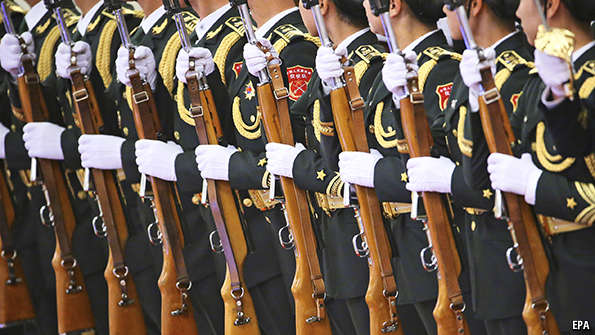
SO SECRETIVE is China’s army that it began admitting foreign journalists to its monthly—and highly uninformative—briefings only last year. But in the past few months extraordinary revelations have appeared in the Chinese media about corruption in the highest ranks of the People’s Liberation Army (PLA): a deputy chief of logistics built a mansion for himself modelled on the Forbidden City (among his treasures was a statue of Mao Zedong, in gold); the country’s most senior uniformed officer had a basement stacked high with cash; and in January it emerged that no fewer than 15 generals, including a former deputy chief of the nuclear arsenal, were being investigated for graft (see article). Never before in China’s history have so many high-ranking officers faced such charges at once.
The lifting of the veil that normally shrouds the world’s largest military force is evidence of the clout of Xi Jinping, the chief of the Communist Party, state president and, most importantly, commander-in-chief of what Mr Xi insists on reminding officers is the party’s army. No leader since Deng Xiaoping in the 1980s has held such sway over the armed forces. His purge of its highest echelons may be partly aimed at crushing potential rivals. But it is also part of Mr Xi’s campaign against corruption throughout the party and government and it has struck fear into the hearts of politicians and military officers, regardless of their loyalties.
Mr Xi should now use his grip over the PLA to achieve more than just suppress the rampant practice of buying ranks and doing dodgy business deals. The army remains largely unchanged in two important, and worrying, ways. First, it is still deeply wary of contacts with its Western counterparts. During the cold war, America and the Soviet Union worked out codes of conduct to prevent accidents between their warships or fighter planes. In November China and America inched in the same direction. But the agreement between Mr Xi and Barack Obama is full of loopholes. China’s army does not accept the kind of surveillance that the Americans and Russians routinely carried out near each other’s territory during the cold war. The scarcity of “mil-mil” contacts makes it harder for America and China to communicate in times of crisis.
Secondly, the PLA fosters a paranoid fear within its ranks that America is bent on China’s destruction. A new directive published this month calls for tighter ideological background checks on soldiers to prevent “sabotage by hostile forces”. Mr Xi, like his predecessors, sees this as important for discipline.
It is only natural for the PLA to be suspicious of the American army and vice versa. But if the two countries are to cultivate a “new type of great-power relationship”, as Mr Xi often says he wants and the world clearly needs, then their relations have to be built on stronger foundations. Mr Xi, it was announced this week, will travel to America in September for his first state visit. It would help if he curbed his army’s tendency to portray America as China’s arch-enemy.
Carrier diplomacy
America, too, sometimes wears cold-war spectacles. This month the Pentagon said it would not send an aircraft-carrier on a visit to China this year, an idea that both sides had been mulling. Pentagon officials, it seems, agree with John McCain, a hawkish Republican senator, who said that sending “one of the most sophisticated and lethal military tools in world history” would be a mistake at a time of anxiety in Asia about China’s “aggressive” behaviour in the region. In fact, it would be a bigger mistake not to send the carrier. Such a gesture could help to forge ties with a military establishment that America needs to know better. And it would be a timely reminder to Chinese generals—some of whom speak dismissively of American strength—that America still wields a very big stick.
sourche: http://www.economist.com/news/leaders/21643140-xi-jinping-bringing-corrupt-army-heel-now-he-must-make-it-behave-responsibly-lifting
Δεν υπάρχουν σχόλια:
Δημοσίευση σχολίου